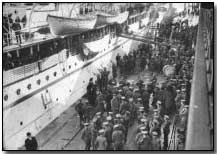Memoirs & Diaries - War is War - Leave
 Burrage
got leave to London only after more than a year in France.
Burrage
got leave to London only after more than a year in France.
"To this day I hardly know which attitude of mind I found the more offensive; to be regarded as a splendid fellow, or as a lucky lad who had had a nice picnic and was going to have some more of it.
"The old gentlemen who had given their sons were still extremely patronising. You see, I hadn't any to give. The younger men who had not seen active service or, for various reasons, any service at all, were rather irritating. Most of them tried to imply that they had been having just as rough a time as the men in the trenches, and talked about air-raids and the bomb which had fallen only three-quarters of a mile away.
"Politicians seemed to be unpopular not only with civilians but with all ranks of the Army. They interfered with the schemes of the Higher Command who, to do them justice, would have shortened our miseries if they could by getting us killed off even more quickly than they had already contrived.
We cannon-fodder disliked them for their bombastic speeches. Apparently they were never going to sheathe the sword until two provinces we had never seen had been ceded to a nation we didn't particularly like. It is very easy to be brave when somebody else is doing the fighting for you. My own courage as a civilian in 1914, when I seemed to have little prospect of being anything else, was little short of magnificent.
I found that people at home seemed to take a fiendish delight in asking me silly questions. The favourite one was, when did I think the war was going to end? I always answered that we had a saying that the first seventeen years would be the worst."
Next - Fear, Friends and Black Humour
Photographs courtesy of Photos of the Great War website
A "red cap" was a British military policeman.
- Did you know?
